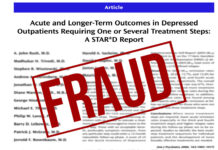So You Say You Want a Revolution Part Two
Establishing a comprehensive drug review map will make possible a complete assessment of the expenditures on psychiatric drugs. I predict that these expenditures are going to surprise and concern anyone responsible for managing these costs.
Traditional Healing and Psychosis vs. the Promises of Modern Science
As noted in Anatomy of an Epidemic, the prognosis for someone experiencing psychosis is far better in developing countries than in industrialized countries. Robert Whitaker and others posit that this is due to the treatment models used in the developing world, as well as to debility and chronicity caused by psychiatric drugs themselves. I think it's also important to explore traditional tribal and village based models of helping people experiencing psychosis and examine why they may be effective. Do these traditional societies know something we don't?
A Decade of Searching for the Needle in the Haystack
Ever since I recovered from pharmaceutical abuse that nearly killed me over a decade ago, I haven’t used mental health services. There were many reasons for this and I can’t say I was always decidedly against them for myself, or entirely convinced I couldn’t be helped by a good therapist. And then I got lucky, and found someone I can talk to each week.
Marci Webber Granted a Conditional Discharge
In 2010, Marci Webber killed her four-year-old daughter during a psychotic episode that erupted while she was on a cocktail of psychiatric drugs. She was found not guilty by reason of insanity. A judge has now ruled that she should be discharged from a mental hospital.
CBT: Part of the Solution, Part of the Problem, an Illusion, or All...
Cognitive behavioral therapy or CBT has been pretty heavily criticized by a number of Mad in America (MIA) bloggers and commenters in the past few years. In a way that isn’t surprising, because most MIA bloggers are looking for radical change, and CBT often appears to be part of the establishment, especially within the therapy world. But while I’m all for criticizing what’s wrong with CBT, especially with bad CBT, I think there’s also a danger in getting so caught up in pointing out real or imagined flaws that we fail to notice where CBT can be part of the solution, helping us move toward more humanistic and effective methods of helping.
It Gets Better: Neuropsych Doctor Confirms Psych Drug Iatrogenesis, PTSD, Brain Injury
To those who are still suffering, it gets better. Indeed, I do not consider myself ill anymore. I consider myself HEALING, which is a vibrant state of movement and change. My limitations do not mean that I am sick. Learning to make boundaries for my well-being has been one of the healthiest things I’ve learned to do. Deeply respecting the needs of this body/temple is one of the most wonderful achievements of WELLNESS.
Investigators Who Blew the Whistle On STAR*D Fraud Call for Retraction of Five AJP...
A letter that Ed Pigott and Jay Amsterdam sent to Ned Kalin, editor-in-chief of the American Journal of Psychiatry.
Everyone’s Afraid of an Angry Woman: Honoring Sinéad O’Connor
In her tragic passing, I choose to honor her by raising up these words she said, by hearing and believing them.
The Boy in the Closet — How I Lost my Best Friend to a...
Lables such as schizophrenia mask all of the strengths, feelings and talents that individuals possess, The labels can make people's behavior appear aggressive, when in fact they are terrified. On the other hand, people in extreme states respond as all humans do to an approach that is calm, supportive, and allows them the space that they need at critical times. Individuals who have been abused, neglected, or suffered from traumatic experiences communicate these fears to those who have the patience and willingness to listen to them.
12 Mental Health Design Principles to Replace This Thing
One of the issues we face in mental health is that everyone knows the system is broken, but there is no replacement yet. So the question is, what are the mental health design principles to build a replacement? How do you build a functional mental health system that isn't disease-based? How do you make it robust, scalable and spreadable?
Madness Radio Interview with Mike Cornwall on Jungian Approaches to Madness and Renewal
What if people struggling with madness could explore their emotions in a supportive sanctuary? Do frightening 'psychotic' experiences have the power to transform and heal? Is breakdown also breakthrough? Michael Cornwall became a therapist after surviving his own crisis -- without medication or psychiatric treatment. For more than 30 years he has worked in the tradition of Carl Jung and R.D. Laing to support people to go through psychotic states in medication-free community settings, including John Weir Perry's Diabasis House in the 1970s.
The Downfall of Peer Support: Are You Kidding Me?
In April of this year, Sera Davidow authored a blog titled “The Downfall of Peer Support: MHA & National Certification.” I do not agree with much of what she says in her blog, and as the vice president of Peer Advocacy, Supports and Services at Mental Health America I'd like to respond.
Study 329 Trick, Treat or Treximet
Regulators seem all too happy to license ever more dangerous variations or combinations of older drugs already on the market and causing serious problems. This willingness has offered an opening for financial speculators to make a killing speculating on the likely profits these drugs could yield, and getting out of the game before much happens.
‘I’d Rather Die Than Go Back to Hospital’: Why We Need a Non-medical Crisis...
It was exciting going back to my old stamping ground. Years ago I’d worked in one of the local community mental health teams and had referred many women to the Drayton Park Crisis House. Walking up the steps of the house brought back memories of standing there with desperate and suicidal clients, some of whom had told me that they would rather die than go back into hospital. As you can imagine, to say I had been glad that there was an alternative would have been an understatement.
UN to USA: Forced Treatment is Prohibited
The experience with the UN Working Group on Arbitrary Detention's visit to the US is a watershed for our work against forced psychiatry. Step by step, global and national advocacy support each other as part of a worldwide movement to abolish forced psychiatry using the UN human rights framework.
How I Developed a Critical Perspective on Psychiatry
I saw many people admitted to psychiatric wards having suffered a recent or past trauma, only to leave with prescriptions for multiple drugs.
Michelle Carter Part IV: Did She Tell Conrad to “Get back in the truck”?
There is no text, transcript or recording that demonstrates that Michelle ever said anything to Conrad about getting back in the truck to die. The DA’s entire case is based upon the “confession” of an irrational girl on antidepressants who has been trying to communicate with her boyfriend in heaven via phone.
Insane Medicine, Chapter 7: Industrialised Psychotherapy Markets Western Folk Psychology (Part 1)
Sami Timimi explores the common factors that influence therapy’s success, the evidence base for psychotherapy, and the over-promotion of CBT.
Hurricane Harvey, Trump and US Mental Health: We Are All Mad, 100%!
Apparently someone felt that I was giving President Trump a way out of his moral dilemma. However, I feel we all have moral obligations that do not end when we have mental and emotional problems. In fact, our freedom and empowerment when we are troubled may be necessary for our recovery and survival.
The Origins of Mental Health Services
In order to explore the current political context of mental health services, as I will be doing in some upcoming blogs, it is necessary to establish what the modern mental health system actually consists of and what function it serves. It is only by tracing the historical development of mental health services, and analysing how and why the system arose, that we are able to fully comprehend its actual purpose.
The UK’s IAPT Service Is an Abject Failure
Despite the hype, the IAPT is hardly “world-beating.” In fact, it is a doubtful model for other countries to follow. Over half of IAPT clients don’t even attend two sessions.
Fate of a Whistleblower: I Spoke Out About Abrupt Med Withdrawal
A rapid withdrawal can be very dangerous and even deadly. You do not solve the problem by firing those who point this out, but that happened to me.
Peruvian Legal Capacity Reform – Celebration and Analysis
Peru has moved closer to full compliance with the UN Convention on the Rights of Persons with Disabilities than any other country in the world. Here I analyze the Peruvian reform as it pertains to legal capacity and the right to be free from disability-based detention and forced medical interventions.
How We Started the Bay Area Hearing Voices Network
Voice hearers have created a community. Often, for the first time, they feel safe to talk about their experiences and reach out for support.
Letters From the Front Lines
Dear Bob:
Saw a young man recently, early 30s, who wanted help withdrawing from benzodiazepines.
He had been on escalating doses of Xanax for two years. The...

























